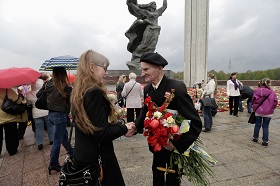Belarus prepared for Victory Day as for one of the main national celebrations, updating its content in the current international context. By virtue of the logic of how events have developed over the last eighteen months, Belarus has been raised to a special regional role connected with restoration and maintenance of international peace and security in Europe. And it is endeavouring to fulfil this role, assuming not only the dividends but also the costs of doing so.
Since Alexander Lukashenko came to power in 1994, Victory Day, the memory of it and its symbols have become an integral part of Belarusian statehood and the ideology of the Belarusian state. Back then, 20 years ago, when many ex-Soviet countries were aggressively revising the Soviet legacy, the people of Belarus and the Belarusian leadership definitively determined Victory Day as a sacred day for the country.
There are many reasons for this. There is the price Belarus paid for the Victory: one in three of its people died during the under four years the war lasted.
And there is the fact that Belarus made a substantial contribution to the Victory, including a partisan movement that was unique in scale and intensity.
Also important is the fact that the totally ruined country was restored and acquired the vital material foundations (infrastructure and industry) for its life today specifically during the period of postwar restoration and development: the generation of partisan leaders achieved industrialisation of the country and concentration here of considerable resources from the Soviet centre.
Finally, Belarus’s full-scale entry into the international arena was also connected with the Great Victory: it was in 1945 that the Belarusian Soviet Socialist Republic joined the USSR and the Ukrainian SSR in signing the United Nations Charter, thus formalising its international capacity.
For this and many other reasons, in the mid-1990s, the new Belarusian leadership irrevocably incorporated the Great Victory and everything associated with it into the model of its national statehood. The main national celebration – Independence Day – was set on the day Minsk was liberated from the German Nazi occupation forces (3 July 1944) and Victory Day became an event with celebrations on an equal scale.
Jubilee year 2015 is no exception in this respect. The entire country is preparing for the big celebration: the streets and public transport have been decorated, back yards and buildings are being cleaned up and a multitude of events are being planned, including a Victory Parade on 9 May itself. This year, as previously, the President of Belarus will receive the parade in Minsk after paying tribute to our victorious ancestors in Moscow on 7 and 8 May.
The absence of the Belarusian leader from the Moscow Parade on 9 May is perceived negatively by many, of course, mainly because participation in the given event has acquired an additional political tinge owing to the conflict between Russia and the West over the Ukrainian issue. The Belarusian leadership decided, however, that the political climate should not be allowed to dictate a change in the content and procedure for celebrating Victory Day. And there is profound political sense in this.
For Belarus, the Great Victory is important not only as a victory over an external enemy but also for the values the victors defended as being universal, truly common to all. For Belarus, such values are, above all, peace, equality of peoples and nations and social justice.
In previous years, the focus was laid in the last two of these values, which were embodied in the Belarusian political and socio-economic structure model, whereas in 2015, against the background of the Ukrainian crisis, international and domestic peace and security have become especially relevant. Belarus is specific in its geopolitical position, socio-economic development and regional co-operative links, meaning that the very existence of the Belarusian state is problematical in a world where this value, like the other two, cannot be implemented. This fact, this adherence to universal values, provides the basis for shaping the attitude of the Republic of Belarus as a sovereign state to global processes and realities. Through this, Belarus possesses and is trying to maintain the global scale of its statehood and avoid declining into a parochial mentality and classical Eastern-European nationalism, which is always relativist on the value plane.
This is why, at the Victory Parade in Minsk on 9 May, not only Belarusian but also Russian and American troops will march past. This is why, speaking at the gala meeting dedicated to the 70th Anniversary of the Soviet people’s Victory in the Great Patriotic War, President Lukashenko paid tribute and expressed respect and gratitude to those who fought on the side of the Allies – the countries of the anti-Nazi coalition, and to activists of the anti-fascist Resistance, adding that “the leading and key role in the general anti-fascist struggle was played by the Soviet Union”.
By virtue of the logic of how events have developed over the last eighteen months, Belarus has been raised to a special regional role connected with restoration and maintenance of international peace and security in Europe. And it is endeavouring to fulfil this role, assuming not only the dividends but also the costs of doing so. Belarusians see this as their duty to the generation of Victors, their contribution to the sacred cause of the Great Victory – the cause of peace, equality and justice.





